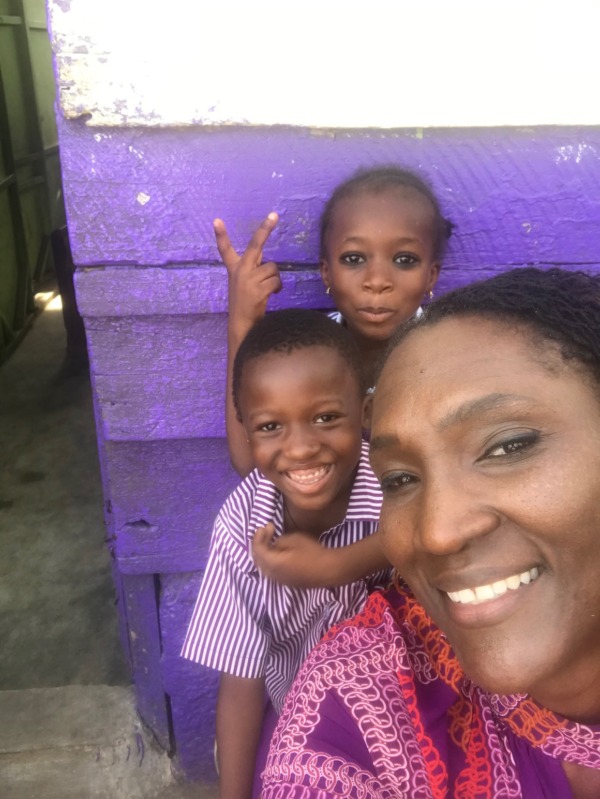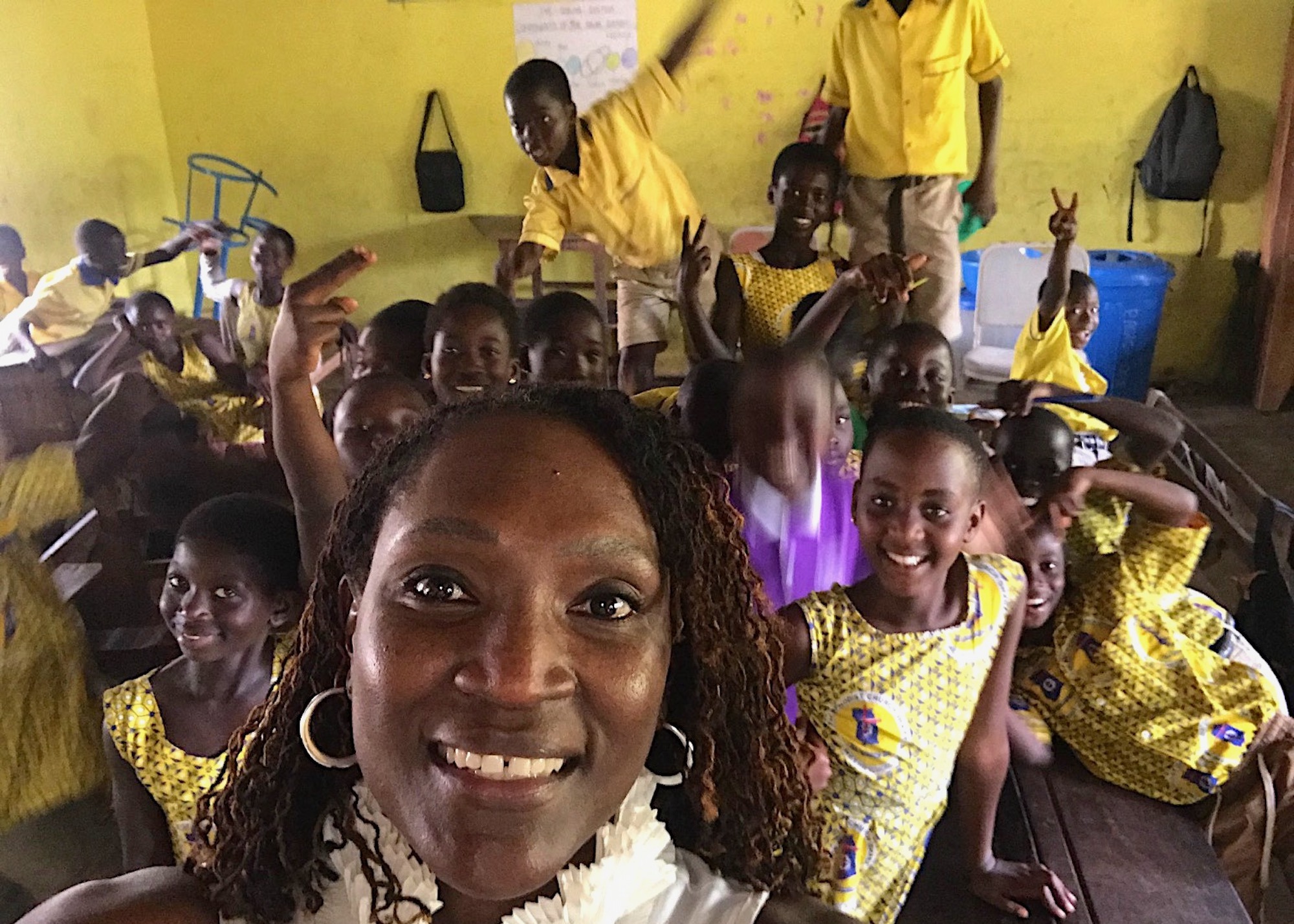In 2019, Dionne Cross Francis, Ph.D., the Joseph R. Neikirk Term Professor at the UNC School of Education, traveled to Ghana for two weeks to meet with mathematics teachers tasked with rolling out a new curriculum. She returned as a Fulbright Scholar from 2021-22. Here, she reflects on why she went, how it improves her work with U.S. teachers, and the benefits of a national curriculum.
I have worked with mathematics teachers in the U.S. for a really long time, nearly 15 years now, trying to understand them as individual professionals.
What does it mean to require a teacher to change how they think about math? How do they think about themselves as mathematicians? How do they think about themselves as math teachers? What identity do you take on when you enter the classroom?
I also think a lot about what it means for math teachers to empower students as problem-solvers and thinkers. It’s not just teaching their students more math. The research I have done shows that to achieve this there has to be an affective and psychological shift in how teachers enter the mathematics space.
That’s an individual journey. There are commonalities across teachers, but they are individual people, independent thinkers who come to believe what they believe through different experiences.
From my work with U.S. teachers, I learned a lot about the American cultural context and how it shapes teachers’ views of themselves as teachers, and how we can help to support them in transforming their practices. I spent a lot of time with teachers — in classrooms with teachers — learning about how they make instructional decisions and what influences those decisions.
In 2019, I was concluding work directing a research center at Indiana University. That role focused on advancing the research of other faculty, supporting colleagues in securing funding while trying to move the mission of the center forward. There were many aspects that were fulfilling work as we were able to work with a range of school communities to build partnerships that improved student outcomes.
But, I wasn’t really focusing on the ideas I was interested in exploring. I needed to reconnect with data and the vision I had for my research.
I needed new and different opportunities to expand how I was thinking as a person and as a researcher. In addition to the U.S., I had previously worked with teachers in several other countries and had observed the role of culture and context had in what mathematics learning looked like in classrooms, how teachers positioned themselves in relation to math and math teaching, and consequences for student learning and engagement. I wanted to better understand the dynamic interaction among the teacher, students, and content and how this unfolded across different contexts.
While the majority of my research focuses on math teachers in the U.S., my work has always considered how we can support communities of color and not just ones in North America. I’m Jamaican, and even though I’m a naturalized U.S. citizen, I still consider myself an immigrant in many ways. I have always wanted to do work that supports developing countries, especially countries and communities of color that have been exploited in some way.
I return to Jamaica often to work with teachers and support them to instruct in student-centered ways. An ongoing partnership withâ¯theâ¯Reggae Math Foundationâ¯enables me to provide professional development for a couple of weeks every year.
This burgeoning interest to deepen my understanding of teacher mathematical development across contexts dovetailed with a colleague’s interest to expand the international locations available for pre-service teachers to complete their student teaching. Her program had an exhaustive list of European countries but none on the continent of Africa. I narrowed options by exploring English-speaking countries that were not in current conflict and where there was something interesting going on educationally.
At that time, Ghana was rolling out a new mathematics education curriculum, a national curriculum that aligned with many of the principles we know from research supports student learning and helps them to develop as competent problem-solvers.
The preamble of that curriculum contextualized the need for change and really centered on citizenry, nation-building, and equity. That’s phenomenal. When do you pick up any curriculum document and see it grounded in nationalism, community advancement, and the nurturing of and care for each other. This was how they had contextualized a mathematics curriculum not an education system. I remember reading through that document and being blown away.
And I remember thinking to myself, “I must go there.”
For those of us working in the context of the United States where states set curricula, seeing a brand-new curriculum up close and in its earliest stages is an intriguing opportunity as a researcher. Coming from Jamaica, which has a national curriculum, I know of the benefits and drawbacks of a single curriculum.
The prior Ghanian curriculum was very teacher-centered, positioning the teacher as the one with all the knowledge, standing at the board, telling students what they need what to do and know. They regurgitate ideas. Their approach to instruction, organization of content, and textbooks were outdated. From research, we know that, while students might pass exams, they often struggle develop strong problem-solving skills. The new curriculum takes a student-centered approach and a move away from the traditional.
I was curious. How might Ghanaian teachers take up these new ideas, and what might that look like? One specific area of interest to me: What does it mean for Ghanaian teachers to teach in student-centered ways?
To me, teaching in student-centered ways means that you, as a teacher, have to value students’ voices and ideas equitably. And that those voices and those ideas can and should challenge you. You have to put ideas out there for your students to grapple with to really create a classroom context that advances their thinking. The viability and the validity of your ideas and those of your students’ is what pushes the learning forward in a classroom.
That approach can be difficult for a teacher anywhere. In the Ghanaian context, I would have expected that to be the case where age is highly respected by young people and teachers embrace the identity as an authority figure. How would those teachers work to dismantle that structure?
After receiving support from IU, I went to Ghana for two weeks, trying to understand the teachers’ experiences with rolling out this new curriculum. I visited nine schools – five private and four public. I observed K-6 classrooms and spoke to teachers one-on-one.
Some of the teachers still wanted to be positioned as the authority. There were two I distinctly remember who just never let go of that traditional way. I have seen many math classrooms, and this was unsurprising.
However, for the majority of teachers I spent time with, the exact opposite was true. Those seven teachers tried to do new things. They were open to finding different kinds of activities. They were open to allowing students to talk more. They were open to sharing ownership of their classroom with their students.
One veteran teacher I worked with was skeptical, but open to change and to me helping him to teach in student-center ways, providing students space to have more agency in their learning and crafting ideas. He did so on one condition; he wanted to test the approach. He would teach two classes, each with a different approach. In one section, he lectured. In another, he provided his students with engaging activities and opportunities to work together and learn from each other. In the latter class during one lesson, students were so engaged they wanted to work through the bell for lunch. He told me that had never happened in all his years of teaching. The students in his traditional section caught wind of this format and demanded the same.
That’s the kind of math classroom I envision for any cultural context. It was inspiring to see. More inspiring is why many of those teachers were excited about this new curriculum. It was the first time I had interacted with teachers who were so excited about a change, and their excitement was grounded in the thought that this was what was best for their children and it would advance the nation. All of the teachers I spoke with expressed a similar idea — this new curriculum would move Ghana forward as a nation by developing Ghanian children as thinkers; this curriculum would ultimately be good for society. They saw this curriculum as reinforcement of why they became teachers. High test scores were never mentioned. There was an authenticity in their responses, their expressions were not rehearsed.

I was able to observe classrooms in Accra, the capital city, and then travel to a neighboring, more rural community, Aburi to experience different contexts. What was fascinating was that the lessons were only two days apart. Of the schools I visited, four of the classes were all on the same topic. They literally were within days of the same lesson. To experience that was amazing. I thought, “No one’s ever going believe me.”
While the content was not the most engaging for me — I saw the same lessons a few times — its value was profound. A child could move from one region of Ghana to another and only miss a couple of days of school. In the U.S. moving from one school district to the next, you could lose three months.
Think of what that might mean for an individual or a family in the U.S. or anywhere who cannot remain in the same space all the time for a range of reasons. Consider about a low-income family who has to go where work is and doesn’t have the resources to fill the gaps in knowledge. Having a national curriculum would be an academic game-changer for transient families.
This standardization can also help teachers. Teachers across Ghana could support and help each other because what they were teaching from day to day was so similar based on the curriculum. In the U.S., we’re so connected through social media. If we were all generally on the same page, teachers could support other teachers in that space. There are possibly hundreds of teachers who have taught these lessons before, including teachers in their own district, that they could learn from, but imagine the space for even more productive communication, imagine where mathematics education could go.
That time in Ghana foregrounded how in some ways we tend to look at developing countries as always needing input, resources, ideas from developed, more advanced countries.
There was such vast richness there and so much to learn from their teachers and their education system more broadly.
That was 2019. I came back to U.S. and thought to myself, “I must go back.”
Cross Francis returned to Ghana as a Fulbright Scholar from August 2021 to June 2022 — helping teachers grow their practice and maximize the outcomes of the new math curriculum. Many of the teachers she worked with there still communicate with her on WhatsApp.
